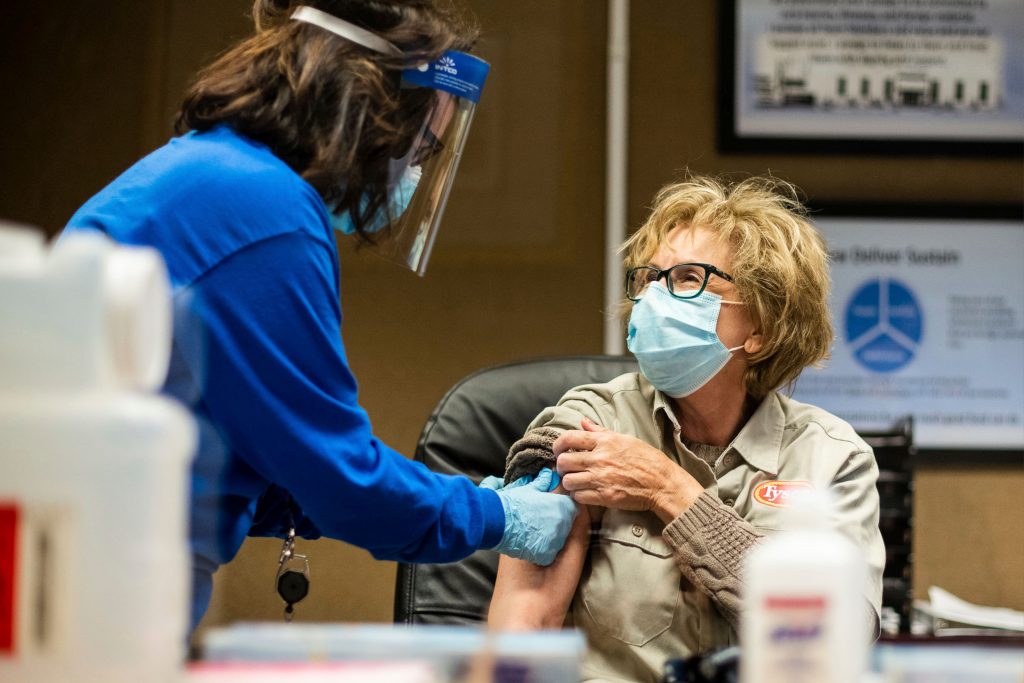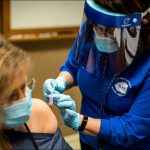For nearly two years, the world has been fighting against an unpredictable and deadly virus. I joined Tyson Foods as Chief Medical Officer almost a year ago, in the middle of the pandemic. I am a physician with a background in public health, specializing in occupational medicine, and have spent most of my career in large companies focusing on the health and wellbeing of employees.
I joined Tyson not because I thought my job was going to be easy, but rather because I knew it was going to be both challenging and worthwhile. I knew I was joining a company that cared, and wanted, more than anything, to protect its team members.
Today, nearly all our team members are vaccinated against COVID-19. Positive COVID-19 cases have plummeted; our data show that those breakthrough cases we’ve had amongst the fully vaccinated have been mostly asymptomatic or have mild, cold-like symptoms. As a physician, nothing could make me happier.
How did we get here? The short answer is this company used everything that was available to combat the virus and protect the health and safety of our team members.
We began our efforts in January 2020, before the virus was detected in the U.S., trying to learn the lessons from our overseas facilities and prepare as best as we could.
We bought masks for our team members before they were widely available, sourcing them directly from overseas and flying them over ourselves. We installed physical barriers between team members working at our plants, providing face shields when barriers were not possible. We expanded break rooms and cafeterias to provide for social distancing and slowed production to account for COVID-related labor availability issues.
Some plants, like our Berry Street, Ark. facility, paid to have more than 25,000 masks sewn for their team members, before the Centers for Disease Control (CDC) recommended surgical masks. Today, every Tyson facility has robust COVID-19 mitigation protocols in place, including team members serving as COVID-19 safety monitors, temperature and symptom screening, and a comprehensive testing and contact tracing program.
We hired 200 additional occupational health staff, bringing our total to more than 600. We partnered with the experts at Matrix Medical to help develop our COVID-19 monitoring strategy and assure the right safety measures are in place. And Tyson hired its first Chief Medical Officer – me – to help lead our medical response.
As soon as COVID-19 vaccines were available, we made sure that our team members had accurate information about them, and we committed to a long-term plan to ensure vaccinations were available onsite. Team members who got vaccinated on their own time were paid four hours for each dose of the vaccine. At some of our plants, like Amarillo, Texas, we made vaccines available for team members and their families 24 hours per day for an extended period of time.
In August, we announced that vaccination would be a condition of employment at Tyson. This decision had its critics – many of them vocal, all of them passionate. It was a difficult decision to make, and a hard one to implement, but we did it because the vaccines are the single best way to protect our team members and their families from the deadly impacts of the virus. We did it not because it was politically expedient – it was not – but because it was the right thing to do for the health and safety of our team members, their families, and the communities where we operate. And once we made the decision, then we got to work.
We have held more than 150 onsite vaccination events and to encourage vaccination, we’ve given away over $6 million in our “Healthy Heroes” incentives. At our Berry Street, Ark. plant – the first to hit a near-100% vaccination rate – as in others like it, vaccinated team members were eligible to win $10,000 in weekly drawings. Every vaccinated frontline team member received a $200 thank you payment. This is, of course, in addition to actions we took to raise wages across Tyson – today we pay an average of $22/hour, including full medical and other benefits.
But most important to our success was this: the many, many individual conversations that team members across this company have had with their fellow team members to listen, with empathy, to the concerns they had about the COVID-19 vaccines.
I have personally spent many long hours talking to team members across the country. Last month, I spoke to a gentleman who is a single parent with young children. He feared the vaccine, but also knew people in his community who had died from COVID-19. I addressed his concerns and reassured him that getting vaccinated was the most important thing he could do right now to keep himself healthy so he could be there for his kids. I later learned that he got vaccinated the next day. At another one of our plants, a young woman wanted to get vaccinated, but her boyfriend didn’t want her to – she didn’t need information, but she did need to know that she had our support for her decision. From our CEO down to our plant level team members, we have all had a role to play – and I couldn’t be prouder of the way we’ve played it, while still keeping this country supplied with the food Americans needed and wanted.
Critics will say that Tyson Foods could have done more. We forget, today, about those chaotic early days of the pandemic when the medical information seemed to change daily. What I will say is we did everything we could, with the best information that was available at the time, and our response evolved as we learned more about the virus. And once we received guidance from the CDC, we followed it and exceeded it – and still do today.
And now, with the availability of COVID-19 vaccines that are highly effective at preventing severe disease, even our critics must concede the incredible amount of time and dedication it has taken to achieve what will be one of America’s first fully vaccinated workforces.



